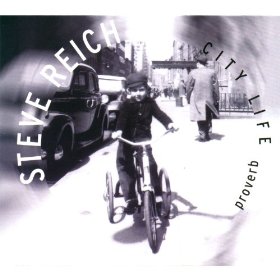Reich City Life; Proverb; Nagoya Marimbas
View record and artist detailsRecord and Artist Details
Composer or Director: Steve Reich
Genre:
Vocal
Label: Nonesuch
Magazine Review Date: 2/1997
Media Format: CD or Download
Media Runtime: 42
Mastering:
DDD
Catalogue Number: 7559-79430-2

Tracks:
| Composition | Artist Credit |
|---|---|
| City Life |
Steve Reich, Composer
(Steve) Reich Ensemble Bradley Lubman, Conductor Steve Reich, Composer |
| Proverb |
Steve Reich, Composer
(Steve) Reich Ensemble Paul Hillier, Conductor Steve Reich, Composer Theatre of Voices |
| Nagoya Marimbas |
Steve Reich, Composer
Bob Becker, Marimba James Preiss, Marimba Steve Reich, Composer |
Author:
“How small a thought it takes to fill a whole life” (Ludwig Wittgenstein) – an apposite quotation chosen by a man who has spent virtually his whole life filling musical compositions with minimalist ideas. Where Steve Reich scores is in the sheer quality of those ideas; their power, purity and potential for elastic expansion or contraction. It’s gonna rain, Drumming, Music for 18 Musicians, Music for Large Ensemble, Different Trains and now City life all make maximum creative capital out of a few strong ideas. The Wittgenstein quotation (Culture and Value, written in 1946 but published many years later) serves as the basis of Proverb for three sopranos, two tenors, vibraphones and two electric organs, a composition that was premiered as a partial work ‘in progress’ at a 1995 Prom. The complete piece (it plays for some 14 minutes) holds together very well. Three sopranos “sing the original melody of the text in canons that gradually augment, or get longer”, whereas Perotin’s influence can be heard in the tenor parts. Reich’s skill at inverting, augmenting and generally transforming his material has rarely sounded with such immediacy.
After a virtuosic, pleasantly up-beat Nagoya marimbas (four-and-a-half minutes’ worth of hyperactive – and melodically rich – rhythmic patterns), comes City life, in my view Reich’s best piece since Different Trains (1988). The sound-frame includes air brakes, pile drivers, car alarms, boat horns and police sirens, all of which are loaded into a pair of sampling keyboards and played alongside the instrumental parts (two each of flutes, oboes, clarinets and pianos, plus string quartet and bass). The first movement opens with what sounds like a distant relation of Stravinsky’s Symphonies of Wind Instruments then kicks into action on the back of a Manhattan street vendor shouting “Check it out”. The second and fourth movements witness gradual acceleration – the second to a pile driver, the fourth to a heartbeat – and the third has the two sampling keyboards engaging in top-speed crossfire based on speech samples. The last and most dissonant movement utilizes material taped when the World Trade Centre was bombed in 1993. I’d describe City life as a tightly crafted montage, formed like an arch (A-B-C-B-A), lean, clever, catchy and consistently gripping. In fact the whole disc (all 42 minutes of it) should thrill dyed-in-the-wool Reichians and preach convincingly to the as-yet unconverted. The sound is excellent.'
After a virtuosic, pleasantly up-beat Nagoya marimbas (four-and-a-half minutes’ worth of hyperactive – and melodically rich – rhythmic patterns), comes City life, in my view Reich’s best piece since Different Trains (1988). The sound-frame includes air brakes, pile drivers, car alarms, boat horns and police sirens, all of which are loaded into a pair of sampling keyboards and played alongside the instrumental parts (two each of flutes, oboes, clarinets and pianos, plus string quartet and bass). The first movement opens with what sounds like a distant relation of Stravinsky’s Symphonies of Wind Instruments then kicks into action on the back of a Manhattan street vendor shouting “Check it out”. The second and fourth movements witness gradual acceleration – the second to a pile driver, the fourth to a heartbeat – and the third has the two sampling keyboards engaging in top-speed crossfire based on speech samples. The last and most dissonant movement utilizes material taped when the World Trade Centre was bombed in 1993. I’d describe City life as a tightly crafted montage, formed like an arch (A-B-C-B-A), lean, clever, catchy and consistently gripping. In fact the whole disc (all 42 minutes of it) should thrill dyed-in-the-wool Reichians and preach convincingly to the as-yet unconverted. The sound is excellent.'
Explore the world’s largest classical music catalogue on Apple Music Classical.
Included with an Apple Music subscription. Download now.

Gramophone Digital Club
- Digital Edition
- Digital Archive
- Reviews Database
- Events & Offers
From £9.20 / month
Subscribe
Gramophone Club
- Print Edition
- Digital Edition
- Digital Archive
- Reviews Database
- Events & Offers
From £11.45 / month
Subscribe
If you are a library, university or other organisation that would be interested in an institutional subscription to Gramophone please click here for further information.






